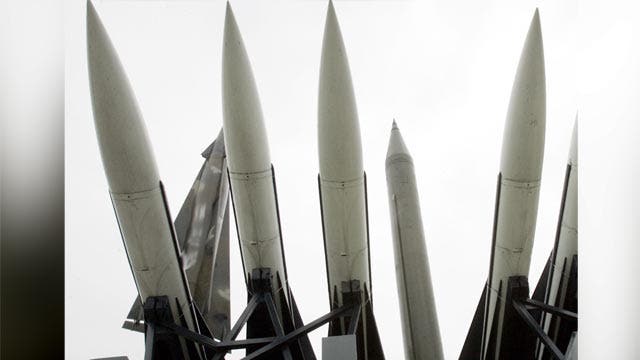Embattled Syrian President Bashar Assad has added a new wrinkle in his war with the newly U.S.-recognized Syrian rebels: Scud missiles.
A senior U.S. defense official says Assad's regime has fired roughly six Scud missiles from Damascus, but there are no immediate reports of casualties.
The New York Times reports the missiles are targeting areas in northern Syria controlled by the Free Syrian Army.
"Using Scuds to target tanks or military bases is one thing," an official told the New York Times. "Using them to target rebels hiding in playgrounds at schools is something else."
The use of Scud missiles also raises alarm because the Soviet-designed missile can be used to deliver chemical weapons. Western officials have warned Assad could unleash his chemical weapons stockpile against rebel forces.
In a press briefing Wednesday, White House Press Secretary Jay Carney could not confirm reports of the Scud missiles fired, but said if it were true it would be "the latest desperate act from the regime showing utter disregard for innocent life."
"If this proves to be true, it's just another indication of the depravity of Assad and his cronies," Carney said.
Meanwhile, rebels continued their advance toward Damascus as fighting intensified in the southern districts of the Syrian capital and its suburbs.
State TV reported an explosion targeting the Syrian Interior Ministry building on Wednesday. Five people were killed in the Wednesday's attacks and 23 others were injured in the attacks, according to a statement by the Interior Ministry.
The Britain-based Syrian Observatory for Human Rights said at least eight people were killed, most of them soldiers, and more than 40 wounded.
Rebels have targeted the center of Damascus with bomb attacks in the past, most dramatically in July when they detonated explosives inside a high-level crisis meeting in Damascus that killed four top regime officials, including Assad's brother-in-law and the defense minister, The Associated Press reports.
On Wednesday afternoon, attackers detonated two explosive devices before an explosives-laden car went off near the entrance of the Interior Ministry building in Kafar Souseh district in Damascus. The blast knocked down walls inside the ministry building, scattering debris on the street and shattering windows in nearby structures, including at the Egyptian Embassy.
Police cordoned off the area. The pro-government Al-Ekhbariya TV showed splotches of blood on the street in front of the ministry.
Syrian TV said the Interior Minister Mohammed al-Shaar and senior officials at the ministry were unharmed.
There was no immediate claim of responsibility for the blasts. An Al Qaeda-linked group, Jabhat al-Nusra, has claimed many deadly bombings inside Syria in the past.
On the political front, more than 100 countries recognized a new opposition coalition as the legitimate representative of the Syrian people during an international meeting being held in Morocco. The U.S. also has declared the coalition is the "legitimate representative" of its country's people. The moves open the way for greater humanitarian assistance to the forces battling Assad and possibly even military aid.
But the presence of extremist groups among the rebel forces has raised concerns in the U.S. and other nations that are supporting the opposition in Syria but do not want to see extremists gain power in the region. The U.S. has blacklisted Jabhat al-Nusra -- Arabic for Victory Front -- as a foreign terrorist organization and said the group was part of Al Qaeda in Iraq.
Al-Nusra fighters appear to be among the most effective fighting forces on the rebel side, spearheading many recent gains, according to the Associated Press.
Western officials have raised concerns that an increasingly desperate Assad might unleash his chemical weapons against rebels.
Syria is believed to have a formidable arsenal of chemical weapons, including sarin and mustard gas, although its exact dimensions are not known. Syria is not a signatory to the 1997 Convention on Chemical Weapons and thus is not obliged to permit international inspection.
The government in Damascus has been careful not to confirm it has chemical weapons, while insisting it would never use such weapons against its own people.
On Wednesday, Human Rights Watch accused the Syrian military of using air-delivered incendiary bombs in at least four locations across Syria since mid-November. Such weapons can contain any number of flammable substances, including napalm, thermite, or white phosphorus, and are designed to set fire to objects or to cause burn injuries. They are not considered chemical weapons.
The Associated Press contributed to this report.









































